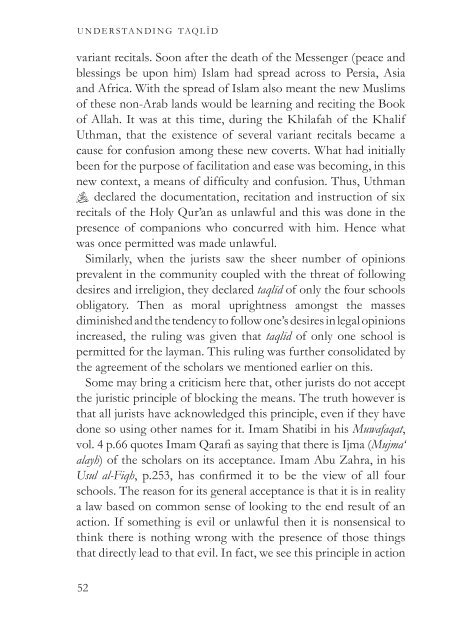Understanding Taqlid by Mufti Muhammad Sajaad
http://www.islamicglobe.com
http://www.islamicglobe.com
You also want an ePaper? Increase the reach of your titles
YUMPU automatically turns print PDFs into web optimized ePapers that Google loves.
understanding taqlīd<br />
variant recitals. Soon after the death of the Messenger (peace and<br />
blessings be upon him) Islam had spread across to Persia, Asia<br />
and Africa. With the spread of Islam also meant the new Muslims<br />
of these non-Arab lands would be learning and reciting the Book<br />
of Allah. It was at this time, during the Khilafah of the Khalif<br />
Uthman, that the existence of several variant recitals became a<br />
cause for confusion among these new coverts. What had initially<br />
been for the purpose of facilitation and ease was becoming, in this<br />
new context, a means of difficulty and confusion. Thus, Uthman<br />
g declared the documentation, recitation and instruction of six<br />
recitals of the Holy Qur’an as unlawful and this was done in the<br />
presence of companions who concurred with him. Hence what<br />
was once permitted was made unlawful.<br />
Similarly, when the jurists saw the sheer number of opinions<br />
prevalent in the community coupled with the threat of following<br />
desires and irreligion, they declared taqlīd of only the four schools<br />
obligatory. Then as moral uprightness amongst the masses<br />
diminished and the tendency to follow one’s desires in legal opinions<br />
increased, the ruling was given that taqlīd of only one school is<br />
permitted for the layman. This ruling was further consolidated <strong>by</strong><br />
the agreement of the scholars we mentioned earlier on this.<br />
Some may bring a criticism here that, other jurists do not accept<br />
the juristic principle of blocking the means. The truth however is<br />
that all jurists have acknowledged this principle, even if they have<br />
done so using other names for it. Imam Shatibi in his Muwafaqat,<br />
vol. 4 p.66 quotes Imam Qarafi as saying that there is Ijma (Mujma‘<br />
alayh) of the scholars on its acceptance. Imam Abu Zahra, in his<br />
Usul al-Fiqh, p.253, has confirmed it to be the view of all four<br />
schools. The reason for its general acceptance is that it is in reality<br />
a law based on common sense of looking to the end result of an<br />
action. If something is evil or unlawful then it is nonsensical to<br />
think there is nothing wrong with the presence of those things<br />
that directly lead to that evil. In fact, we see this principle in action<br />
52














